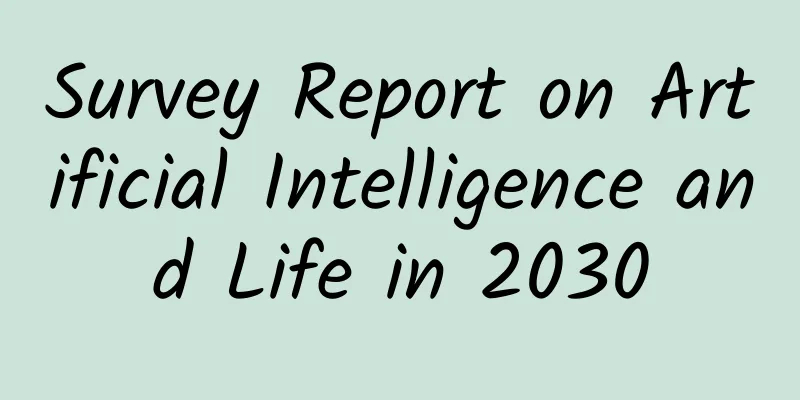Beware of scams! Master these practical tips to keep you away from online rumors!

|
There is a line in the movie "Keep You Safe": "When you open your mouth and call a woman a lady, whether she is or not, she already is one." This kind of malicious rumor-mongering phenomenon described in the movie has been happening all the time in today's era when the Internet is extremely popular and developed. For example, the recent online rumor about the overtime work of China Electronics Technology Group Corporation was a rumor and the chat records were fabricated; a college student who maliciously photoshopped a picture of a female classmate and was reported by the school and expelled from school; last year, a girl born after 1995 was rumored to have faked her academic qualifications and had an immoral life because she dyed her hair pink... Copyright image, no permission to reprint 01 Rumors are just words It takes a lifetime to heal Spreading rumors can be described as the lowest-cost weapon. As the saying goes, "It takes only one mouth to spread a rumor, but it takes a lot of effort to refute it." When rumors spread widely, victims not only have to spend a lot of money to refute them and protect their rights, but it also causes great psychological harm to the victims , and they may even have to spend their entire lives to heal. They will feel angry, sad, depressed, and some will experience feelings of fear and helplessness, which will also affect their daily lives, including the inability to concentrate, loss of interest in many things, and even feeling that life is meaningless and having thoughts of suicide. Copyright image, no permission to reprint Since rumors often have negative social impacts on victims, they worry that their image and reputation will be irreversibly damaged. At the same time, it is difficult to determine who has seen the false information, causing great psychological pressure and anxiety. If these negative emotions continue, the victim may suffer from sleep disorders, anxiety or depression, and may also develop inferiority, introversion and neurotic personality tendencies. It is precisely because rumors are so harmful that we all advocate “not making rumors, not believing rumors, and not spreading rumors”. However, no one is perfect, and each of us may unconsciously believe in rumors and become a spreader of rumors. Therefore, let’s talk about how to “not make rumors, not believe rumors, and not spread rumors” based on the characteristics of rumors and people’s cognitive psychological characteristics. 02 Avoid preconceptions Keep questioning The most fundamental characteristic of rumors is that the false information lacks evidence support or the source cannot be traced, and is often just some unconfirmed statements or speculations. Therefore, the simplest and most direct way is to question and investigate the source and evidence of some uncertain information when you see it, and confirm whether this information is just some unconfirmed speculations. Copyright image, no permission to reprint However, from a psychological point of view, this simplest and most direct method is not so "simple", because we are in a vortex of massive information on the Internet, and we often process information in an instant, which is what we usually call "intuition" or "preconception". This can easily cause us to believe these false information before questioning it. As early as 1947, psychologists Albert and Postman proposed the classic rumor spreading formula: rumor intensity = ambiguity of the current situation × importance to the individual. That is to say, if people are in an ambiguous situation where they lack a sense of control, and the topic related to the rumor is important to the individual, the rumor will be easily believed and spread. For example, during the epidemic, rumors that gargling with salt water and taking probiotics and antibiotics can prevent infection are easily spread widely, rumors about campus safety are more likely to be believed by parents, and rumors about acidic foods causing cancer and baking soda treating cancer are more likely to be believed by middle-aged and elderly people who pay attention to health. Therefore, the more critical the moment and the more important the matter is to oneself, the more you should remain skeptical. 03 Stay rational Take control of your anxiety Psychological research has also found that if the content of a rumor involves a lot of negative emotions, it will be more inflammatory and spreadable. For example, some studies have found that health rumors involving death anxiety account for the highest proportion of WeChat rumors, rumors that induce physiological disgust are more likely to spread, and videos that induce disgust and anger are also more likely to be spread. Copyright image, no permission to reprint This is because negative emotional stimulation is closely related to the most basic needs of human survival and safety, and is more likely to attract attention and cause anxiety. When people are in an anxious state, they lack a sense of control, which causes rational thinking to become weaker than emotional thinking. Therefore, in order to maintain a skeptical attitude towards unconfirmed information, on the one hand, we must be especially vigilant during periods of major public events, when rumors that are difficult to distinguish between true and false are often easily bred; on the other hand, we also need to be vigilant about whether this information is trying to trigger our negative emotions and avoid having our rationality overwhelmed by anxiety. 04 Stay objective Reduce bias I believe many people have played a group game called the message game. Several people line up in a team. When the first person receives a message, he passes it to the second person until it is passed to the last person. Finally, by comparing the original words and the final message conveyed, you will find that there may be a big deviation. This is because, judging from the common cognitive characteristics of people in information processing, our cognitive resources are limited. Therefore, when faced with new information, we will pay more attention to the important, prominent, and interesting information. Coupled with the interference of a lot of irrelevant information, it will cause us to lose details in the process of information processing and dissemination, and then cause deviations and form false information. Research has found that about 70% of the details are lost during the spread of rumors. At the same time, because everyone has their own focus and understanding of the same thing, some specific details will be selectively spread, and some seemingly similar information will be assimilated. It should be noted that this deviation in information dissemination is not necessarily caused intentionally by the disseminator. This is like the game of telephone. Everyone has certain cognitive biases and limitations, which leads to information loss and misunderstanding when relaying a thing. Copyright image, no permission to reprint Therefore, when relaying information, we should try our best to ensure objectivity and comprehensiveness. Even if this is not possible, we can try to make detailed explanations when relaying to remind the audience. 05 Independent thinking Avoid deviation From the perspective of social groups, some common social psychological phenomena can also lead to information bias, thereby facilitating the spread of rumors. The most obvious of these is the "herd effect", also known as the "herd effect". It refers to the tendency of people to behave in a direction consistent with the majority due to group pressure from reality or phenomena. The herd effect is considered to be a nature that has evolved with the development of people's sociality, and people can easily become herd-like without intending to do so. Another thing is "stereotype". It refers to the relatively fixed, general and abstract views that people have on a certain type of person or thing. In psychology, it is often believed that stereotypes are also the way people use to quickly understand new things. When people face new information, they will use internal value schemas to select, interpret and reconstruct information. Stereotype is one of these schemas. When new information is inconsistent with stereotypes, people are more likely to believe information that is consistent with their own internal beliefs and stereotypes, and sometimes they will reinterpret the information accordingly, which will cause deviations in the process of information dissemination. Therefore, even as social animals, we must maintain our independent thinking among the crowd and not be led astray by inherent tendencies. References: [1] Peng Xiaozhe, Cui Fang, Jiao Can & Li Hong. (2018). Research on the context, content, characteristics of spreaders and audiences of rumor spreading and related cognitive neuroscience. Psychological Science (04), 916-921. [2] Zhao Na, Li Yongxin & Zhang Jianxin. (2013). A review of the research on the influencing factors and motivational mechanisms of rumor propagation. Psychological Science (04), 965-970. doi:10.16719/j.cnki.1671-6981.2013.04.015. [3] Li Qi. (2021). Research on the emotion-driven mechanism of scientific rumor network transmission (Master's thesis, Liaoning University). [4] DiFonzo, N. (2010). Ferreting facts or fashioning fallacies? Factors in rumor accuracy. Social and Personality Psychology Compass, 4(11), 1124-1137. [5] Allport, GW, & Postman, L. (1947). The psychology of rumor. New York: Henry Holt and Company. Produced by | Popular Science China Author | ACC Psychology Popular Science Author Review | Tang Yicheng, Deputy Director of Beijing Zhongke Popular Mental Health Promotion Center The cover image and the images in this article are from the copyright library Reproduction of image content is not authorized |
>>: Strong winds and sandstorms will hit tomorrow! How to avoid "eating dirt"?
Recommend
Pinduoduo’s monthly card operating routine!
The latest version of Pinduoduo's money-savin...
SEM promotion effect is not good, what aspects should be adjusted?
Why does the problem of poor SEM promotion effect...
Are the three consecutive earthquakes a sign of a coming major earthquake? Experts: Not credible!
Today (February 9), earthquakes occurred successi...
How to view the Douyin store expert list? How can I get into the Douyin store expert list?
This article mainly introduces how to view the Do...
Popular Science Comic | What is the origin of the "Mongolian Cyclone" that mass-produces strong spring winds?
my country is affected by strong winds all year r...
Independent live streaming platforms have reached a turning point: Either they stand with the giants or they fall with the wind
"The situation is much worse than you said.&...
Google launches game dashboard and 3-speed game mode API for Android 12
[[410960]] July 13 news Google held a game develo...
Unity Awards 2015 is about to start, and good games are coming soon!
Unity Awards 2015 (Game and Application Creativit...
Interview with Zhang Xinlei, community manager of Surround the Nervous Cat: The secret to the success of HTML5 games
[[121181]] On July 22, 2014, a game called Surrou...
How can online education improve purchase conversion rate?
If you are working in the education industry, you...
In the first quarter of 2022, 113,000 new Tesla electric vehicles were registered in the U.S. market, a year-on-year increase of 59%.
Like Apple, the US market is also very important ...
Don’t worry about your phone being “bent”! Learn about the “gold film” that makes your phone bend without bending.
Recently, Samsung released the fifth generation o...
Soul-searching question: How can we have a satisfying snowfall?
Recently, our friends in the south have not seen ...
With an accuracy rate of over 98%, AI unlocks a new way to screen for cancer early! Will the era of early cancer treatment be here?
Cancer has always been one of the most challengin...









